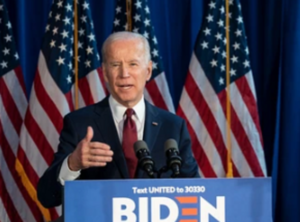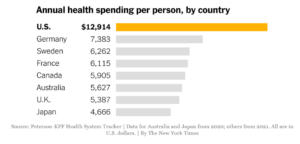
(New York Times – David Leonhardt, Ian Prasad Philbrick) — As his re-election gets underway, President Joe Biden is signaling that healthcare, and particularly, the cost of it, will be central to his campaign.
“We’re taking on powerful interests to bring your health care costs down,” he has said. “I’m just tired of seeing Americans ripped off,” he said last month. Tomorrow, he will hold an event at the White House at which he is expected to announce the first 10 drugs that will be part of a new program in which Medicare officials can negotiate with pharmaceutical companies to reduce drug prices.
Biden is emphasizing the cost of health care partly because it has been one of his administration’s biggest priorities, even if other policies — such as those on the climate and infrastructure — receive more attention. His administration has reduced the cost of hearing aids, reduced the cost of health insurance for people who buy it though an Obamacare exchange and reduced an array of expenses for Medicare recipients.
“Millions of people benefit from the health care provisions,” Larry Levitt, an executive vice president at KFF, a health care research group, told us. Some people, he added, will save “a lot of money.”
Biden and his aides understand that these policies are popular with swing voters, who, as this newsletter has described before, tend to lean left on economic issues while being more conservative on many social issues. That’s particularly true of swing voters who don’t have a four-year college degree. The president has described his health care policies as part of “Bidenomics in action.”
“If you look at the polling data, it’s overwhelmingly popular, what we’ve proposed,” Biden said earlier this year. “Matter of fact, it’s a hell of a lot more popular than I am.”
Today’s newsletter delves into the specifics — and some of the criticisms — of Biden’s health care agenda.
The Medicare Provisions
The Inflation Reduction Act — a law that Biden signed last year, centered on clean-energy funding — also includes measures to lower drug costs for Medicare recipients. Virtually every American age 65 and older is on Medicare, and many will save hundreds of dollars a year in out-of-pocket expenses. Those who spend the most on drugs will likely save a few thousand dollars a year, according to KFF.
Where do those savings comes from?
- As of this past January, the law caps a Medicare recipient’s out-of-pocket spending on insulin at $35 per month. The cap will save about 1.5 million Americans almost $500 a year on average.
- A provision allows Medicare recipients to receive some vaccines, like those for shingles and tetanus, at no charge.
- The law caps a recipient’s total spending on prescription drugs at $2,000 a year, although the provision will not take effect until 2025, after the upcoming presidential campaign.
- The law penalizes pharmaceutical companies that increase drug prices faster than the overall rate of inflation; in recent years, half of the drugs Medicare covered would have qualified. The law also includes the policy that allows Medicare officials to negotiate with pharmaceutical companies to reduce prices.
Those last couple of provisions will probably have a bigger effect on the government’s health care spending than on household spending. But less government spending still benefits Americans in the long run by reducing the need for taxes.
Beyond Medicare
People under 65 don’t benefit as much from Biden’s agenda, but many do benefit to some degree:
- The Inflation Reduction Act increased tax subsidies for Americans who get health insurance through the Obamacare exchanges. More than 13 million people will each save about $800 a year on average. The policy is temporary, expiring in 2026.
- An executive order that Biden signed in 2021 led the F.D.A. to allow drugstores and other retailers to sell hearing aids over the counter. The change reduced the cost of hearing aids by more than half. Before the change, the average cost of hearing aids was about $5,000.
- Biden is trying to close some loopholes that some hospitals and insurers have used to continue sending large, unexpected bills, despite a bipartisan 2020 law, signed by Donald Trump, to prevent the practice.
Potential Problems
The underlying reason for Biden’s push is that Americans pay more for medical care than the citizens of any other county. There are several causes, but many experts believe that the main factor is simply that the U.S. government doesn’t prevent drug companies, hospitals and insurers from charging high prices. An influential 2003 article in an academic journal made this argument bluntly in its headline: “It’s the prices, stupid.” These high prices translate into higher profits for health care companies.

Still, there are some potential advantages to the U.S. system. High prices create an incentive for companies to develop new drugs, some of which save lives. Four of the world’s five largest drug companies are based in the U.S. The pharmaceutical industry warns that lower Medicare prices may hamper innovation, although many independent analysts — including those at the nonpartisan Congressional Budget Office — predict any such effect will be minor.
Another possible unintended consequence is that drug companies will respond to lower Medicare prices by increasing prices for people on private insurance. If that happened, it would effectively shift money from younger Americans to older Americans, and would probably worsen economic inequality.
Most experts are also relatively sanguine about these potential downsides. But, as Levitt told us, “The truth is, we don’t know.”
For More
- Biden has suggested that if he wins re-election, he will try to take more steps to reduce medical costs. Among them: making Obamacare subsidies permanent and capping insulin costs for privately insured Americans. “There’s more to do,” he has said.
- Medicare will negotiate with drug companies over the first 10 drugs next year, HuffPost’s Jonathan Cohn explains. The negotiated prices will take effect in 2026.
- Some older Americans are being charged hundreds of dollars for R.S.V. vaccines.
